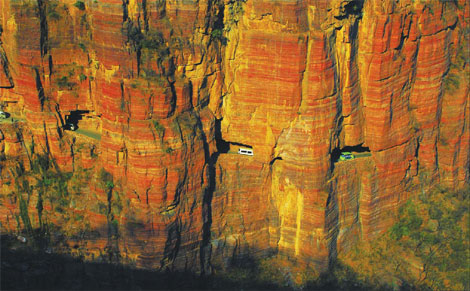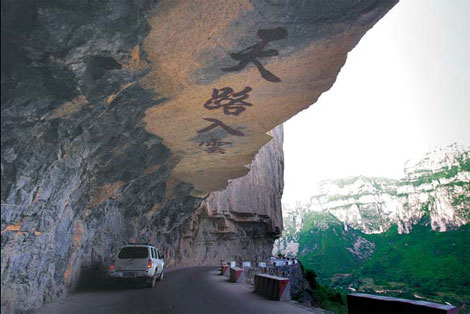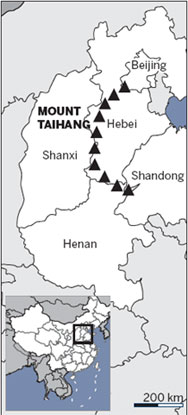Down the rocky road

 |
|
Top and above: Roads zigzag along the cliff of Mount Taihang. Photos provided to China Daily |
A motorway chiseled into a crag leads to an ethereal hamlet. Raymond Zhou and Sun Ruisheng report.
Imagine a 10.6-sq-km fantasyland of lush greenery and waterfalls, surrounded by steep cliffs on all four sides.
It's isolated from the outside world, free from the turmoil of war and conflicts.
Many poets have dreamed of such an enclave.
But, in reality, a cocoon of complete self-sustainment has its own perils. It's dogged by abject poverty and unspeakable inconvenience.
The ancestors of Xiyagou, on Mount Taihang, ended up here as refugees.
For hundreds of years, they lived like primitives, learning how to survive on farming and animal husbandry.
To take on a journey to the outside world meant scaling the heights a la Spiderman.
There was no way to move supplies in or out.
Fruit, cattle or whatever surplus they could not consume did not gain any market value. And anything that could not be produced locally, such as medical supplies, could not be brought in.
Even marriages depended on a barter system. If a household had two sons and one daughter, one of the sons would have to remain a bachelor for life.
In 1962, a county official rode a horse to visit the village. The equine got such a jolt from the precipice "it was scared dead", the story goes.
The magistrate, out of pity, allocated 3,000 yuan ($472, but worth much more at that time) to the village to construct a road.
Thus started the 30-year odyssey for the 7.5-km passage that is appropriately called "the hanging tapestry of a road".
The first attempt resulted in a trail that zigzags along the cliff.

Only daredevils would take it. Villagers once tried to drive 27 pigs to an outside market, and 13 plummeted off the cliff before they had gone a kilometer.
They chose another route the second time but were halted midway by impossible logistical difficulties. Wolves, rather than supplies, started entering the village on this unfinished path.
On the third try, they drilled a hole in a giant rock that turned out to be so hard that it would not yield gravel.
A technician from the transport bureau said it would take 80 years to build the road at this speed. The hole was later used as a sheep shelter.
In 1982, a new design was conceived: This road would spiral across the surface of a cliff, with windows along the way to remove the crushed rocks. Every villager pitched in.
What scarce assets they had - including dowries for soon-to-be newlyweds - they sold to buy tools and dynamite.
A band of young men spent years dangling from ropes to dig into the rock face. Wo-men provided backup support, including cooking and sewing.
A tragic twist marred this otherwise uplifting story in 1991, when the village chief Dong Huaiyue and another man were killed by explosives while clearing away duds.
Villagers don't even need to use this road today.
There is a much faster multi-lane motorway that goes through a tunnel and links to the province-level highway network. Only tourists, departing from Wangmangling on the north side for the village, descend on the now-famous Xiyagou Hanging Road.
It is like walking down a caveman's version of a palace corridor.
On one side is hard rock, and the other side is a succession of "windows", or nothing at all, even a "French window" for that matter. The road's surface is well paved, but the carving of the "columns" or "window sills" remains in a rugged state that conveys the lack of proper tools or sufficient funds for its construction.
Chairman Mao Zedong used to cite the ancient tale of Yugong (Foolish Old Man), who prodded his whole family to "move the mountain that blocks the way of their home".
The more than 200 households in Xiyagou are latter-day Yugongs, whose tenacity has now become a legend.
Busloads of tourists crawl down the tapestry-like road to gawk at the natural wonders and sample the fresh produce.
Villagers no longer worry about fruit rotting in their orchards.
People pay good money for it, which has visibly lifted villagers from sustenance to a decent living standard.
Could it be a coincidence that the Yugong saga is said to have originated from this area?
















